Markus Krötzsch
Oxford University
Towards Mass Spectrum Analysis with ASP
Dec 18, 2025Abstract:We present a new use of Answer Set Programming (ASP) to discover the molecular structure of chemical samples based on the relative abundance of elements and structural fragments, as measured in mass spectrometry. To constrain the exponential search space for this combinatorial problem, we develop canonical representations of molecular structures and an ASP implementation that uses these definitions. We evaluate the correctness of our implementation over a large set of known molecular structures, and we compare its quality and performance to other ASP symmetry-breaking methods and to a commercial tool from analytical chemistry. Under consideration in Theory and Practice of Logic Programming (TPLP).
Nemo: First Glimpse of a New Rule Engine
Aug 30, 2023

Abstract:This system demonstration presents Nemo, a new logic programming engine with a focus on reliability and performance. Nemo is built for data-centric analytic computations, modelled in a fully declarative Datalog dialect. Its scalability for these tasks matches or exceeds that of leading Datalog systems. We demonstrate uses in reasoning with knowledge graphs and ontologies with 10^5 to 10^8 input facts, all on a laptop. Nemo is written in Rust and available as a free and open source tool.
* In Proceedings ICLP 2023, arXiv:2308.14898
Efficient Dependency Analysis for Rule-Based Ontologies
Jul 20, 2022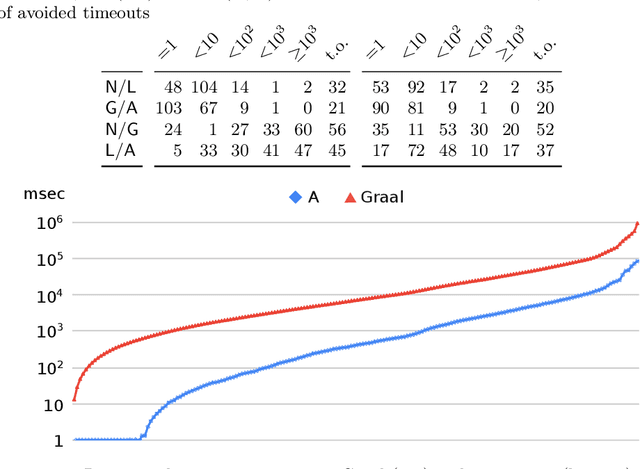
Abstract:Several types of dependencies have been proposed for the static analysis of existential rule ontologies, promising insights about computational properties and possible practical uses of a given set of rules, e.g., in ontology-based query answering. Unfortunately, these dependencies are rarely implemented, so their potential is hardly realised in practice. We focus on two kinds of rule dependencies -- positive reliances and restraints -- and design and implement optimised algorithms for their efficient computation. Experiments on real-world ontologies of up to more than 100,000 rules show the scalability of our approach, which lets us realise several previously proposed applications as practical case studies. In particular, we can analyse to what extent rule-based bottom-up approaches of reasoning can be guaranteed to yield redundancy-free "lean" knowledge graphs (so-called cores) on practical ontologies.
Chasing Streams with Existential Rules
May 04, 2022
Abstract:We study reasoning with existential rules to perform query answering over streams of data. On static databases, this problem has been widely studied, but its extension to rapidly changing data has not yet been considered. To bridge this gap, we extend LARS, a well-known framework for rule-based stream reasoning, to support existential rules. For that, we show how to translate LARS with existentials into a semantics-preserving set of existential rules. As query answering with such rules is undecidable in general, we describe how to leverage the temporal nature of streams and present suitable notions of acyclicity that ensure decidability.
Expressivity of Planning with Horn Description Logic Ontologies (Technical Report)
Mar 17, 2022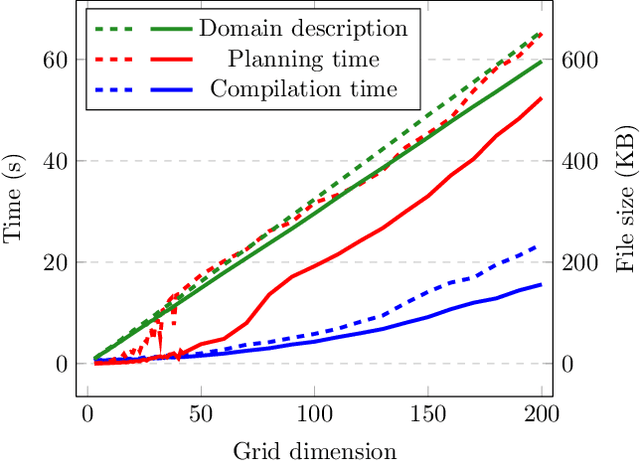

Abstract:State constraints in AI Planning globally restrict the legal environment states. Standard planning languages make closed-domain and closed-world assumptions. Here we address open-world state constraints formalized by planning over a description logic (DL) ontology. Previously, this combination of DL and planning has been investigated for the light-weight DL DL-Lite. Here we propose a novel compilation scheme into standard PDDL with derived predicates, which applies to more expressive DLs and is based on the rewritability of DL queries into Datalog with stratified negation. We also provide a new rewritability result for the DL Horn-ALCHOIQ, which allows us to apply our compilation scheme to quite expressive ontologies. In contrast, we show that in the slight extension Horn-SROIQ no such compilation is possible unless the weak exponential hierarchy collapses. Finally, we show that our approach can outperform previous work on existing benchmarks for planning with DL ontologies, and is feasible on new benchmarks taking advantage of more expressive ontologies. That is an extended version of a paper accepted at AAAI 22.
Column-Oriented Datalog Materialization for Large Knowledge Graphs (Extended Technical Report)
Feb 11, 2016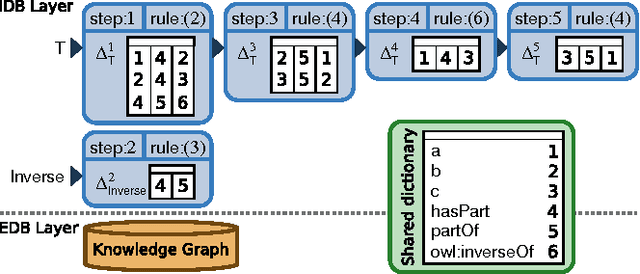



Abstract:The evaluation of Datalog rules over large Knowledge Graphs (KGs) is essential for many applications. In this paper, we present a new method of materializing Datalog inferences, which combines a column-based memory layout with novel optimization methods that avoid redundant inferences at runtime. The pro-active caching of certain subqueries further increases efficiency. Our empirical evaluation shows that this approach can often match or even surpass the performance of state-of-the-art systems, especially under restricted resources.
Acyclicity Notions for Existential Rules and Their Application to Query Answering in Ontologies
Feb 04, 2014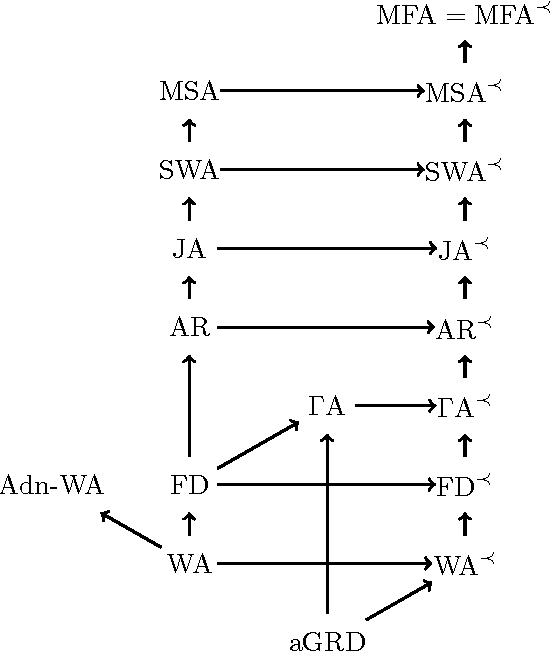

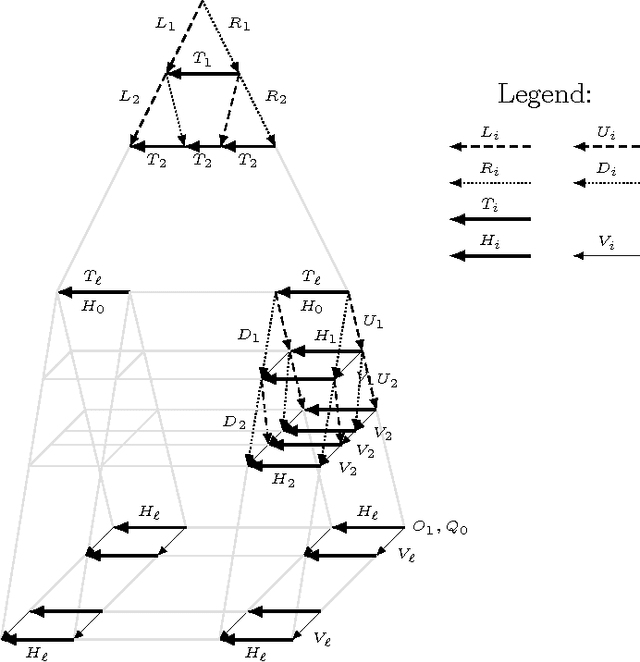

Abstract:Answering conjunctive queries (CQs) over a set of facts extended with existential rules is a prominent problem in knowledge representation and databases. This problem can be solved using the chase algorithm, which extends the given set of facts with fresh facts in order to satisfy the rules. If the chase terminates, then CQs can be evaluated directly in the resulting set of facts. The chase, however, does not terminate necessarily, and checking whether the chase terminates on a given set of rules and facts is undecidable. Numerous acyclicity notions were proposed as sufficient conditions for chase termination. In this paper, we present two new acyclicity notions called model-faithful acyclicity (MFA) and model-summarising acyclicity (MSA). Furthermore, we investigate the landscape of the known acyclicity notions and establish a complete taxonomy of all notions known to us. Finally, we show that MFA and MSA generalise most of these notions. Existential rules are closely related to the Horn fragments of the OWL 2 ontology language; furthermore, several prominent OWL 2 reasoners implement CQ answering by using the chase to materialise all relevant facts. In order to avoid termination problems, many of these systems handle only the OWL 2 RL profile of OWL 2; furthermore, some systems go beyond OWL 2 RL, but without any termination guarantees. In this paper we also investigate whether various acyclicity notions can provide a principled and practical solution to these problems. On the theoretical side, we show that query answering for acyclic ontologies is of lower complexity than for general ontologies. On the practical side, we show that many of the commonly used OWL 2 ontologies are MSA, and that the number of facts obtained by materialisation is not too large. Our results thus suggest that principled development of materialisation-based OWL 2 reasoners is practically feasible.
A Description Logic Primer
Jun 03, 2013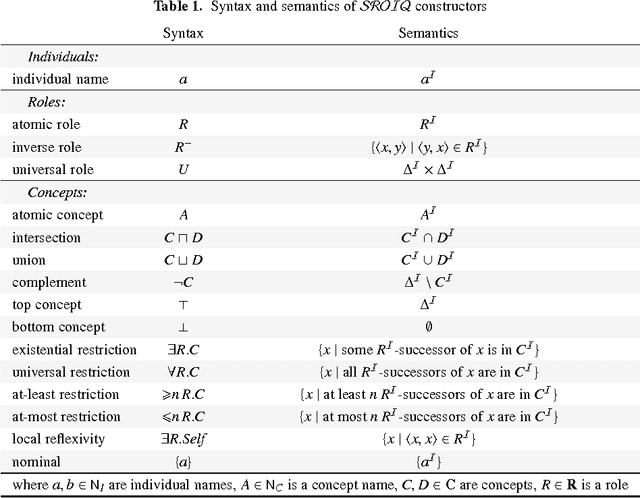

Abstract:This paper provides a self-contained first introduction to description logics (DLs). The main concepts and features are explained with examples before syntax and semantics of the DL SROIQ are defined in detail. Additional sections review light-weight DL languages, discuss the relationship to the Web Ontology Language OWL and give pointers to further reading.
Type-elimination-based reasoning for the description logic SHIQbs using decision diagrams and disjunctive datalog
Feb 23, 2012
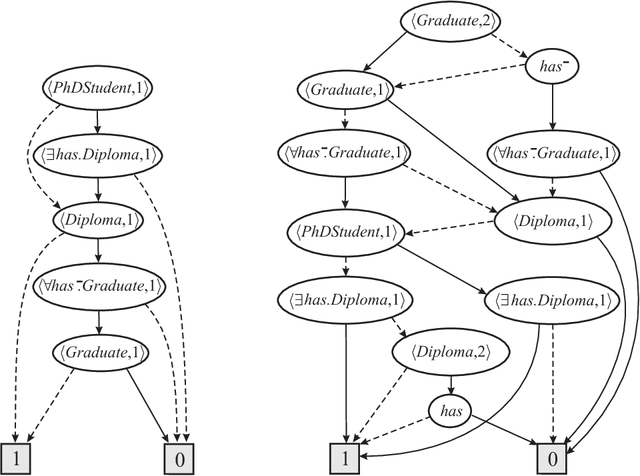
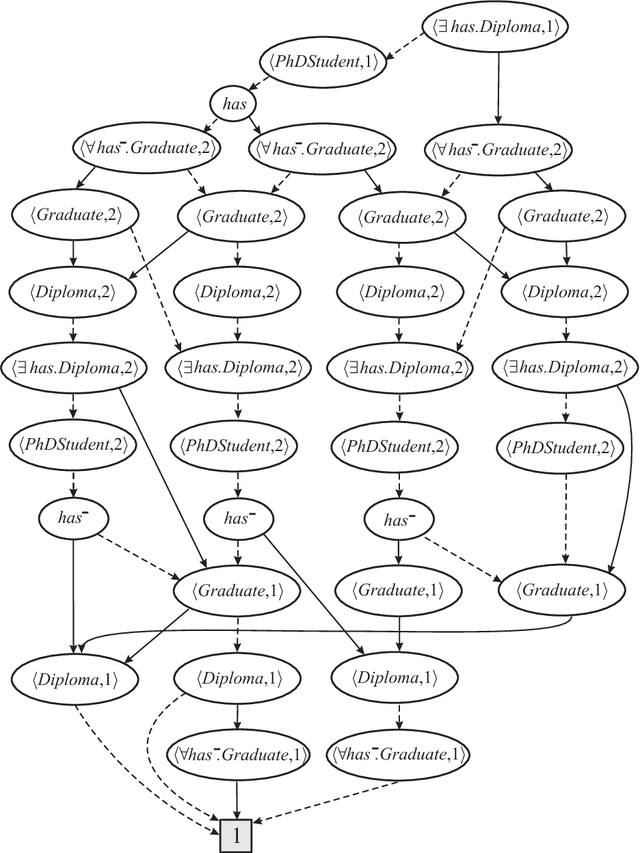
Abstract:We propose a novel, type-elimination-based method for reasoning in the description logic SHIQbs including DL-safe rules. To this end, we first establish a knowledge compilation method converting the terminological part of an ALCIb knowledge base into an ordered binary decision diagram (OBDD) which represents a canonical model. This OBDD can in turn be transformed into disjunctive Datalog and merged with the assertional part of the knowledge base in order to perform combined reasoning. In order to leverage our technique for full SHIQbs, we provide a stepwise reduction from SHIQbs to ALCIb that preserves satisfiability and entailment of positive and negative ground facts. The proposed technique is shown to be worst case optimal w.r.t. combined and data complexity and easily admits extensions with ground conjunctive queries.
* 38 pages, 3 figures, camera ready version of paper accepted for publication in Logical Methods in Computer Science
OWL: Yet to arrive on the Web of Data?
Feb 01, 2012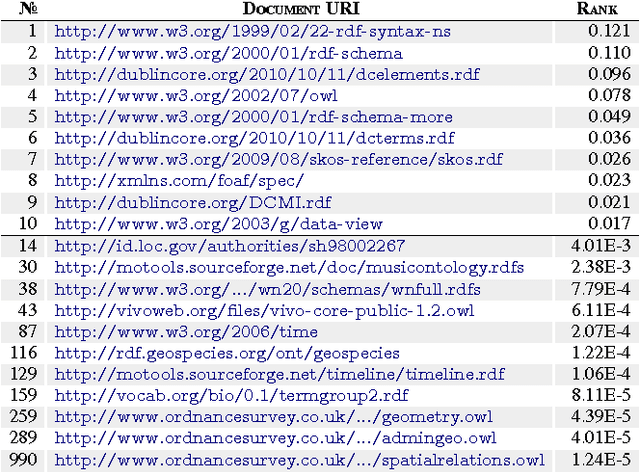
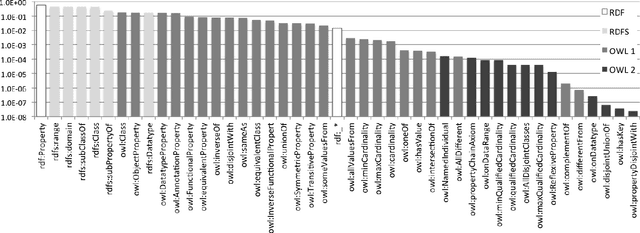
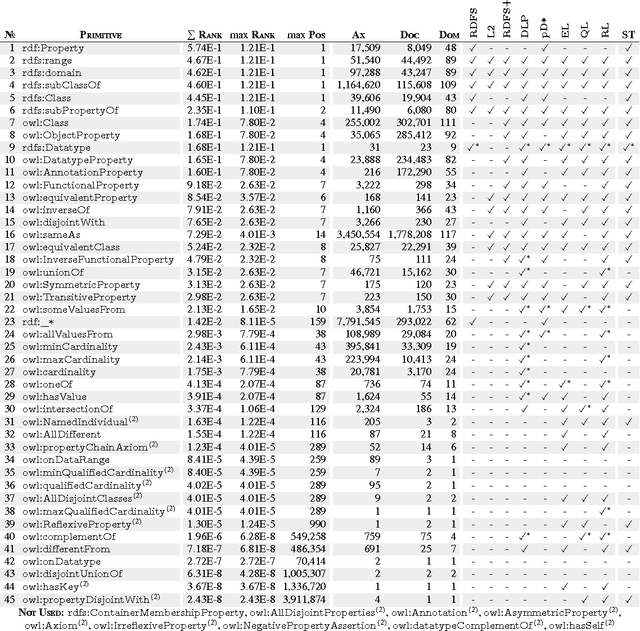
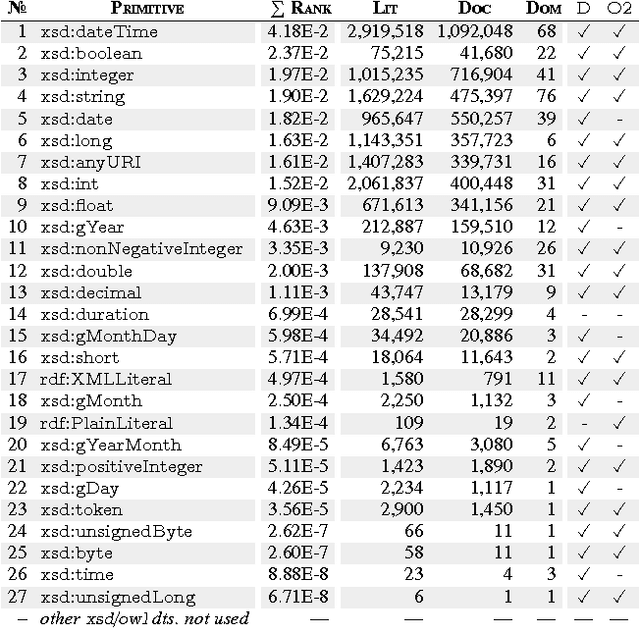
Abstract:Seven years on from OWL becoming a W3C recommendation, and two years on from the more recent OWL 2 W3C recommendation, OWL has still experienced only patchy uptake on the Web. Although certain OWL features (like owl:sameAs) are very popular, other features of OWL are largely neglected by publishers in the Linked Data world. This may suggest that despite the promise of easy implementations and the proposal of tractable profiles suggested in OWL's second version, there is still no "right" standard fragment for the Linked Data community. In this paper, we (1) analyse uptake of OWL on the Web of Data, (2) gain insights into the OWL fragment that is actually used/usable on the Web, where we arrive at the conclusion that this fragment is likely to be a simplified profile based on OWL RL, (3) propose and discuss such a new fragment, which we call OWL LD (for Linked Data).
 Add to Chrome
Add to Chrome Add to Firefox
Add to Firefox Add to Edge
Add to Edge